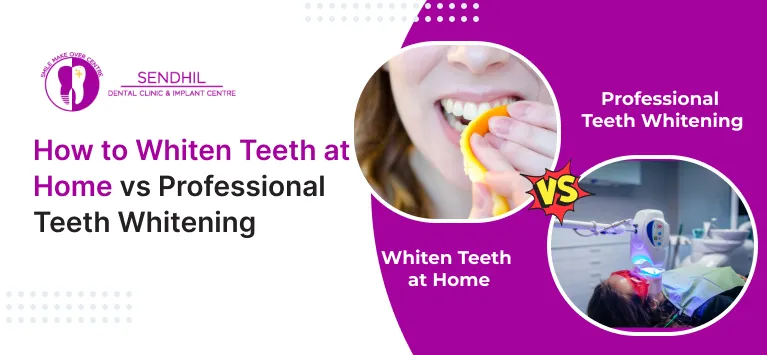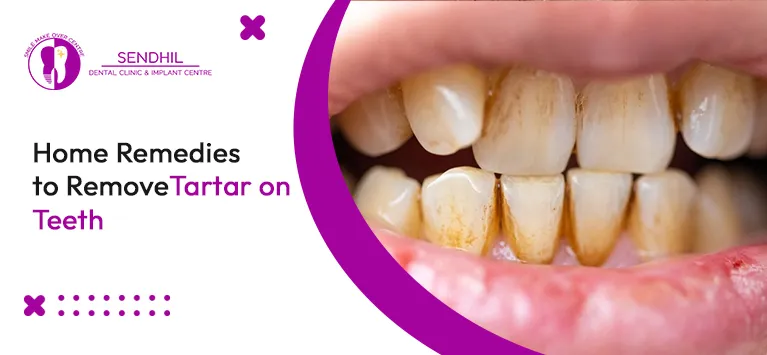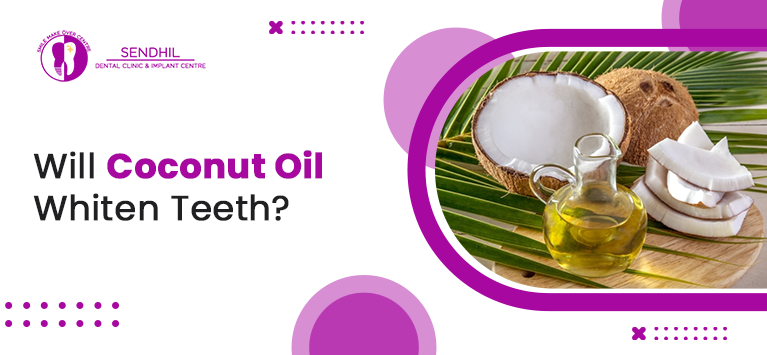
How Long Does Teeth Whitening Last?
Key Facts
- Teeth whitening lasts from 2 months to 3 years, depending on method and habits.
- Professional whitening shows up to 8 shades of improvement in one session.
- LED kits last 2–6 months; whitening strips last 2–4 months.
- 5–15% may experience temporary sensitivity for 1–3 days.
- In-office whitening takes 60–90 minutes. At-home kits require 15–30 mins daily for 1–2 weeks.
Teeth whitening is one of the most popular cosmetic dental procedures. Whether you’re preparing for a big event, maintaining a bright smile, or simply boosting your confidence, it’s natural to wonder: How long does teeth whitening last? The answer depends on several factors, including the type of whitening method used, your lifestyle habits, and how well you maintain your oral hygiene.
In this blog, we will clearly explore everything you need to know about how long teeth whitening lasts, the difference between at-home and professional treatments, and potential side effects like sensitive teeth after whitening and unbearable pain after teeth whitening, along with costs, maintenance tips, and frequently asked questions. We’ll also use real stats and facts to help you understand what to expect.
Table of Contents
What is Teeth Whitening?
Teeth whitening is a cosmetic dental procedure that lightens the color of your teeth using bleaching agents. These agents break down stains and discoloration on the enamel, giving you a visibly whiter smile. There are several types of whitening options:
- Professional Teeth Whitening: Done by a dentist using strong bleaching agents.
- At-Home Whitening Kits: Provided by a dentist or available over-the-counter.
- LED Teeth Whitening: Often found in salons or kits that use blue light to activate whitening gel.
- Whitening Toothpaste or Strips: Low-concentration bleaching agents used daily.
Each of these methods offers different results and durations, which we’ll explore in the next section.
How Long Does Teeth Whitening Last?
Teeth whitening can last anywhere from a few months to 3 years, depending on the method and aftercare. Here’s a general breakdown:
| Whitening Method | Duration |
| Professional Whitening | 6 months to 3 years |
| At-home Whitening Kits | 2 to 6 months |
| Whitening Strips | 2 to 4 months |
| LED Whitening (Home/Salon) | 2 to 6 months |
| Whitening Toothpaste | Temporary (few weeks) |
- According to the American Academy of Cosmetic Dentistry, over 37 million Americans use teeth whiteners.
- A survey found that 62% of users reported noticeable results lasting up to 1 year after professional teeth whitening before and after treatments.
Whitening results fade over time because of the natural wear of enamel and dietary habits such as coffee, tea, red wine, and smoking.
How Long Does Teeth Whitening Last at Home?
How long does teeth whitening last at home? Typically, DIY whitening kits, including whitening strips, last 2 to 6 months. Consistency is key, but overuse may increase tooth sensitivity. At-home LED kits are more effective than strips but less powerful than in-office treatments.
- Avoid pigmented foods for the first 48 hours post-whitening.
- Use a straw to drink colored beverages.
- Brush with a desensitizing toothpaste if you feel discomfort.
Tip:
To extend the results, combine at-home whitening with regular professional cleanings.
How Long Does LED Teeth Whitening Last?
On average, results last 2 to 6 months, depending on the LED kit quality and how often you use it. LED whitening accelerates the bleaching agent, giving quicker and more dramatic results. But again, maintenance is critical. Professional LED whitening lasts longer than at-home kits due to higher peroxide concentrations.
Teeth Whitening Before and After Pictures
In-office whitening treatments give fast, long-lasting results. Professional teeth whitening before and after pictures often show a transformation of up to 8 shades lighter in a single visit.
- Dentists use stronger agents like hydrogen peroxide (15–40%).
- Results can last up to 3 years with proper care.
It’s ideal for people attending weddings, interviews, or photoshoots.



Factors That Affect Whitening Longevity
Several habits and lifestyle choices can affect how long your whitening results last:
- Diet: Coffee, tea, red wine, and dark-colored foods can stain teeth.
- Smoking or Tobacco Use: These can reverse whitening quickly.
- Oral Hygiene: Brushing and flossing daily helps maintain results.
- Dental Cleanings: Regular professional cleanings can enhance longevity.
- Enamel Thickness: Thinner enamel shows more underlying dentin, which is yellower in color.
Does Teeth Whitening Hurt?
It can cause mild discomfort, especially if you already have sensitive teeth. Some people report sensitive teeth after whitening, especially when using high concentrations of hydrogen peroxide.
Common symptoms include:
- Tingling or burning sensation during treatment
- Gum irritation
- Short-term tooth sensitivity
These symptoms typically subside within 24 to 72 hours.
Only 5-15% of people report moderate discomfort after professional whitening procedures.
Unbearable Pain After Teeth Whitening
While most people only experience temporary sensitivity, a few might have unbearable pain after teeth whitening, especially if:
- There are undetected cavities or gum disease
- You overuse whitening kits
- You have thin enamel
Always consult your dentist before starting a whitening treatment. Desensitizing gel or toothpaste can help.
How Long Do Whitening Strips Last?
Whitening strips generally maintain results for 2 to 4 months. They’re best for people looking for a mild brightness boost rather than deep whitening.
However, overuse can cause irritation and sensitivity.
- Follow instructions closely
- Don’t use daily unless specified by the brand
How Long Does Teeth Whitening Take?
It depends on the method:
| Method | Time Required |
| In-office Whitening | 60 to 90 minutes |
| LED Whitening (At Home) | 15–30 minutes daily |
| Whitening Strips | 30 minutes daily for 2 weeks |
In-office procedures provide the fastest results, usually visible immediately.
How Much Does It Cost to Whiten Teeth?
- Professional whitening: ₹8,000 to ₹25,000 (or $200 to $600 in the U.S.)
- At-home LED kits: ₹3,000 to ₹10,000 ($50 to $150)
- Whitening strips: ₹500 to ₹2,000 ($10 to $50)
Results and longevity generally match the investment.
Maintenance Tips for Long-Lasting Whitening
To ensure the whitening lasts as long as possible:
- Avoid foods and drinks that stain teeth.
- Rinse your mouth after consuming colored beverages.
- Quit smoking or chewing tobacco.
- Maintain proper oral hygiene.
- Use whitening toothpaste once or twice a week.
- Get touch-up treatments as recommended by your dentist.
These tips can help extend the brightness of your smile, no matter what whitening method you choose.
Teeth Whitening Myths vs Facts
| Myth | Fact |
| Whitening damages enamel | Safe when done correctly or under dentist supervision |
| Results last forever | Whitening is temporary; results fade over time |
| Over-the-counter is same as in-clinic | In-office treatments are stronger and offer longer-lasting results |
| Brushing harder whitens teeth | Over-brushing damages enamel; doesn’t make teeth whiter |
| Natural remedies like lemon are safe | Acidic substances can erode enamel and cause sensitivity |
Conclusion
Teeth whitening can be a fast and effective way to enhance your smile, but results vary based on treatment type and maintenance. How long does teeth whitening last depends on whether it’s done at home or professionally, how you care for your teeth afterward, and your daily habits. Always consult a dentist before undergoing treatment, especially if you experience sensitive teeth after whitening or fear unbearable pain after teeth whitening.
Frequently Asked Questions
Professional whitening usually takes 60–90 minutes in one sitting. At-home treatments can take 1–2 weeks for visible results.
It typically lasts 2 to 4 months depending on your diet and habits.
Usually, the results last between 1 and 3 months with proper care.
Teeth whitening strips usually offer results that last 1–2 months.
Costs range from ₹500 for OTC products to ₹20,000 for in-office treatments.
Some people may experience temporary sensitivity, but it’s usually mild.

















